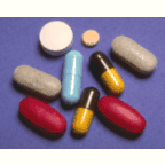The Placebo Effect
 To test new drugs, researchers usually divide their subjects into two groups. One group receives the experimental drug. The other receives a placebo or 'sugar pill' that should have no effect on the illness. Participants don't know which group they are in. In double blind studies, not even their doctors know. Nevertheless, more than one in three of those who take the placebo get better. Why? Maybe they would have improved without treatment. Maybe getting treatment changed their attitude toward the illness. They don't get any better, but they aren't as worried. Or maybe their belief in the treatment stimulates the immune system.
To test new drugs, researchers usually divide their subjects into two groups. One group receives the experimental drug. The other receives a placebo or 'sugar pill' that should have no effect on the illness. Participants don't know which group they are in. In double blind studies, not even their doctors know. Nevertheless, more than one in three of those who take the placebo get better. Why? Maybe they would have improved without treatment. Maybe getting treatment changed their attitude toward the illness. They don't get any better, but they aren't as worried. Or maybe their belief in the treatment stimulates the immune system.
The first evidence of a genuine immune response to a placebo came in 1975 from Robert Ader and Nicholas Cohen at the University of Rochester in New York. They mixed a drug that slows the immune response with sweet water and gave it to rats. The drug worked as expected. The immune response slowed. The surprise came when the same rats got sweet water without the drug. Their immune responses slowed, although the drug was no longer present. Somehow, the rats' brains had dampened the immune system in response to sweet water alone.
If rats can display such complex associations, what are humans capable of? According to the American Psychological Association, optimism is a potent force for good health. Psychologists at the University of California Los Angeles measured confidence and fear among first-year law students. The students showed no differences in their immune systems before school began. By mid-semester, the optimistic students had higher counts of both natural killer and helper T cells than did their pessimistic peers.
About the Author
Faith Brynie, Ph D
 Faith Brynie holds a B.A. in Biology from West Virginia University and an M.A. and Ph.D in science curriculum and instruction from the University of Colorado. She writes books and articles on science and health topics for children, teens, and non-scientist adults. Some of her books have won awards, including two 'Best Book of the Year' citations from the American Association for the Advancement of Science.
Faith Brynie holds a B.A. in Biology from West Virginia University and an M.A. and Ph.D in science curriculum and instruction from the University of Colorado. She writes books and articles on science and health topics for children, teens, and non-scientist adults. Some of her books have won awards, including two 'Best Book of the Year' citations from the American Association for the Advancement of Science.


